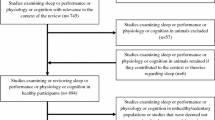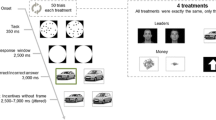Abstract
Gamblers often gamble while experiencing fatigue due to sleep deprivation or cumulative sleep debt. Such fatigue has been shown to make decision makers behave more riskily. The present study aimed to test the role of two cognitive processes, risk perception and risk attraction, in this effect. Two hundred and two participants played twelve hands of a black-jack style card game while either fatigued or reasonably alert. Findings showed that both fatigued and alert participants rated higher risk bets as more risky than lower risk bets, suggesting risk perception was unaffected by fatigue. However, fatigued participants did not rate higher risk bets as less attractive than lower risk bets, and reduced the size of their wager to a lesser extent when objective risk increased. These findings are discussed in relation to the effects of fatigue on motivated tasks and the need for gamblers to be aware of the effects of fatigue.

Similar content being viewed by others
References
Abrams, D., Hopthrow, T., Hulbert, L. G., & Frings, D. (2005). The social context of alcohol consumption: Risk preferences alone and in groups. Journal of Studies on Alcohol, 67, 628–636.
Addicott, M. A., & Laurienti, P. J. (2009). A comparison of the effects of caffeine following abstinence and normal caffeine use. Psychopharmacology, 207, 423–431.
Babad, E., & Katz, Y. (1991). Wishful thinking—against all odds. Journal of Applied Social Psychology, 21, 1921–1938.
Blascovich, J. (2008). Challenge and threat. In A. J. Elliott (Ed.), Handbook of approach and avoidance motivation (pp. 431–445). Psychology Press: New York.
Byrnes, J. P., Miller, D. C., & Schafer, W. D. (1999). Gender differences in risk taking: A meta analysis. Psychological Bulletin, 125, 367–383.
Czeisler, C. A., Weitzman, E. D., Moore-Ede, M. C., Zimmerman, J. C., & Kronauer, R. S. (1980). Human sleep: Its duration and organization depend on its circadian phase. Science, 210, 1264–1267.
Frings, D. (2011). The effects of group monitoring on fatigue related Einstellung during mathematical problem solving. Journal of Experimental Psychology, Applied. doi:10.1037/a0025131.
Harris, A. J. L., & Hahn, U. (2011). Unrealistic optimism about future life events: A cautionary note. Psychological Review, 118, 135–154.
Harrison, Y., & Horn, J. A. (2000). The impact of sleep deprivation on decision making: A review. Journal of Experimental Psychology: Applied, 6, 236–249.
Higgins, E. T. (1997). Beyond pleasure and pain. American Psychologist, 52, 1280–1300.
Hopthrow, T., Abrams, D., Frings, D., & Hulbert, L. (2007). Groupdrink: The effects of alcohol on intergroup competitiveness. Psychology of Addictive Behaviors, 21, 272–276.
Killgore, W. D., Balkin, T. J., & Wesenten, N. J. (2006). Impaired decision making following 49 h of sleep deprivation. Journal of Sleep Research, 15, 7–13.
Krueger, G. P. (1989). Sustained work, fatigue, sleep loss and performance: A review of the issues. Work and Stress, 3, 129–141.
Lavie, P. (1991). The 24-hour sleep propensity function (SPF): Practical and theoretical implications. In T. H. Monk (Ed.), Sleep, sleepiness and performance (pp. 65–93). Oxford, England: John Wiley & Sons.
Li, S., & Liu, C.-J. (2008). Individual differences in a switch from risk-averse preferences for gains to risk-seeking preferences for losses: Can personality variables predict the risk preferences? Journal of Risk Research, 11, 673–686.
Lichtenstein, S., & Slovic, P. (1971). Reversal of preference between bids and choices in gambling decisions. Journal of Experimental Psychology, 89, 46–55.
McBride, J., & Derevensky, J. (2009). Internet gambling behavior in a sample of online gamblers. International of Journal of Mental Health and Addiction, 7, 149–167.
McKenna, B. S., Dickinson, D. L., Orff, H. J., & Drummond, S. P. (2007). The effects of one night of sleep deprivation on known-risk and ambiguous-risk decisions. Journal of Sleep Research, 16, 245–252.
Noy, Y. I., Horrey, W. J., Popkin, S. M., Folkard, S., Howarth, H. D., & Courtney, T. K. (2011). Future directions in fatigue and safety research. Accident Analysis and Prevention, 43, 495–497.
Piper, B. F., Dibble, S. L., Dodd, M. J., Weiss, M. C., Slaughter, R. E., & Paul, S. M. (1998). The revised Piper Fatigue Scale: Psychometric evaluation in women with breast cancer. Oncological Nursing Forum, 25, 677–684.
Rabinbach, A. (1990). The human motor: Energy, fatigue, and the origins of modernity. New York: Basic Books.
Roehrs, T., & Roth, T. (2001). Sleep, sleepiness and alcohol use. Alcohol Research and Health, 25, 101–109.
Roehrs, T., & Roth, T. (2008). Caffeine: Sleep and daytime sleepiness. Sleep Medicine Reviews, 12, 153–162.
Rosenthal, R. J., & Lesieur, H. R. (1992). Self-reported withdrawal symptoms and pathological gambling. The American Journal on Addiction, 1, 150–154.
Steele, C. M., & Josephs, R. A. (1990). Alcohol myopia: Its prized and dangerous effects. American Psychologist, 45, 921–933.
Tversky, A. (1969). Intransitivity of preferences. Psychological Review, 76, 31–48.
Tversky, A., & Kahneman, D. (1974). Judgment under uncertainty: Heuristics and biases. Science, 185, 1124–1131.
Van der Linden, D., Frese, M., & Meijman, T. F. (2003). Mental fatigue and the control of cognitive processes: Effects on perseveration and planning. Acta Psychologica, 113, 45–65.
Venkatraman, V., Chuah, Y. M. L., Huettel, S. A., & Chee, M. W. L. (2007). Sleep deprivation elevates expectation of gains and attenuates response to losses following risky decisions. Sleep, 30, 603–609.
Weber, E. U., Blais, A.-R., & Betz, N. (2002). A domain-specific risk-attitude scale: Measuring risk perceptions and risk behaviors. Journal of Behavioural Decision Making, 15, 263–290.
Weinstein, N. D. (1980). Unrealistic optimism about future life events. Journal of Personality and Social Psychology, 39, 806–820.
Acknowledgments
This research was supported by ESRC grant RES-000-22-3460 and complies with BPS and APA ethical guidelines. The author would like to thank the London University Officers Training Corps for assistance given.
Author information
Authors and Affiliations
Corresponding author
Rights and permissions
About this article
Cite this article
Frings, D. The Effects of Sleep Debt on Risk Perception, Risk Attraction and Betting Behavior During a Blackjack Style Gambling Task. J Gambl Stud 28, 393–403 (2012). https://doi.org/10.1007/s10899-011-9266-9
Published:
Issue Date:
DOI: https://doi.org/10.1007/s10899-011-9266-9




